Editor’s note: We’re grateful to the author and publisher for permission to reprint this article, “52 Faces: Road to Africa Is Paved with Good Intentions,” from The Hawk Eye, the oldest newspaper in Iowa. It originally appeared on May 20, 2018.
Leslee Goldstein had a deep desire to do something fully worthy of her Ph.D.—so many are awarded for mundane, boring things.
“I wanted to do something special,” she said. So she did.
Goldstein grew up in the Detroit suburbs and attended Wayne State University in Detroit for half a bachelor’s degree, studying dance and taking humanities and social studies courses.
“I was thinking of becoming a physical therapist,” she said. “Then I shifted gears, came here to Maharishi International University (now Maharishi University of Management), and finished my education. I focused on education and communication.”
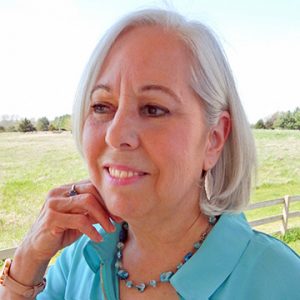
Dr. Leslee Goldstein at her home near Fairfield (Bob Saar for The Hawk Eye)
Goldstein moved to Fairfield, Iowa, in 1975 because of Transcendental Meditation®, or TM®, the technique introduced to America in the 1960s by Maharishi Mahesh Yogi, with a little help from his friends, the Beatles.
“I heard about TM when I was 16, but there wasn’t anywhere to learn at that time in Detroit,” Goldstein said. “The first time I went to a lecture, I came home and told my parents, and they kind of talked me out of it, because they thought it was totally weird. The next time somebody came to give talks, I took my Dad with me, and he decided he wanted to learn, too.”
Goldstein earned her Ph.D. in Vedic Science at Maharishi University of Management, had a fulfilling career in education, raised two kids, Sam and Alena, with husband Bill, and was active in women’s issues.
“For my Ph.D. I decided to do a research study on TM with women, and then I narrowed it to mothers.” —Leslee Goldstein, Ph.D.
“I really wanted to get my Ph.D. for about 25 years, which I was able to do after raising kids and raising parents. Then I headed out to do something for myself. I decided to fulfill that dream,” Goldstein said. “I’ve always worked on projects for women; I gravitated toward different projects that had to do with women. For my Ph.D. I decided to do a research study on TM with women, and then I narrowed it to mothers.”
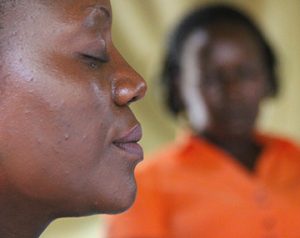
A Ugandan mother, deep in meditation
There wasn’t any research on TM and mothers at the time.
“I feel the role of a mother is so important everywhere, anywhere in the world, because a mother is the first teacher. From the rock of mother, the children learn language, they learn culture, they learn how to behave, they learn how to speak,” Goldstein said. “A mother’s job is a challenging job: You have to be a doctor; you have to be a counselor, a cook—you have to be everything. The list goes on and on, and her job is 24/7; it doesn’t stop. So I started to see how important it is in general for mothers to have a way to stay balanced and to help them do their jobs, because it’s critical for the world.”
Three-fourths of the women in Uganda live in poverty. Of all the people living in poverty in the world, 70 percent are women.
Goldstein wanted to do her research in Africa, and she put out the word to some of the leaders of projects around the world. She knew she had an idea whose time had come.
“Within 48 hours, I had a project with 81 single, illiterate mothers living in poverty in Kampala, in the village of Nsambya in Uganda,” she said.
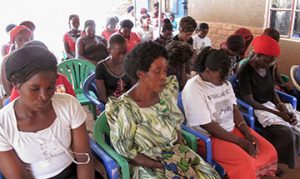
Mothers meditating together at United Women’s Platform for Empowerment and Development (UWOPED) in Kampala, Uganda (photo by Alena Goldstein)
Three-fourths of the women in Uganda live in poverty. Of all the people living in poverty in the world, 70 percent are women.
Goldstein’s research was supported by private funding from the Rona and Jeffrey Abramson Foundation and Rick and Jean Mofsen.
“I have had the pleasure of working with Dr. Goldstein on a number of projects for several years and have such admiration for her capability and accomplishments,” MUM Associate Professor Rachel Goodman said. “She has taken on this great responsibility of helping to bring a much better life to impoverished mothers in Uganda through the TM technique and documenting the success of the technique through her research. The research she did showed that the mothers felt much more able to succeed in their lives, and to support their families, once they had started TM.”
With this success, Dr. Goldstein has gone ahead to plan and facilitate TM programs for women in Africa, not only for those who are living in poverty, but for those who are students, those who are professionals, and even those women in the top levels of the government.
“The research she did showed that the mothers felt much more able to succeed in their lives, and to support their families, once they had started TM.” —Rachel Goodman, Ph.D., MUM Associate Professor
Goldstein felt the gender inequalities in Uganda were over the top and challenging to single, illiterate mothers.
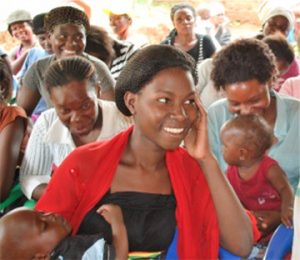
A meeting with mothers in Kampala (photo by Alena Goldstein)
“Most of them drop out of school either because they have to go help the family—work—or they get pregnant,” she said. “The main reason boys drop out of school is lack of interest. A lot of girls in Uganda don’t have an opportunity, especially in rural areas, to finish school. This was all very moving for me to learn.”
Goldstein got the opportunity to go to Uganda assisted by the United Women’s Platform for Empowerment and Development. UWOPED founder and executive director Brenda Nakalembe, over-stressed with her work, sat down in a taxi one day next to a TM teacher who later introduced her to Judith Nassali, the national director of African Women and Girls Organization for Total Knowledge, or AWAGO. Nakalembe learned TM, and it helped her immediately.
“She’s a leader of a successful NGO—a non-governmental organization,” Goldstein said. “These NGOs teach women skills like selling and hairdressing; they give them counseling and how to balance their checkbooks. This is very prevalent in developing countries. They make jewelry; they teach them some kind of livelihood.”
“They had amazing experiences right away” after they learned TM, Goldstein said. “Their headaches went away; they were sleeping better. They started to feel better.”
The biggest challenge Nakalembe had was getting women to come because they were so stressed out. They couldn’t sleep at night; they had headaches and were fatigued all the time.
“They had amazing experiences right away” after they learned TM, Goldstein said. “Their headaches went away; they were sleeping better. They started to feel better.”
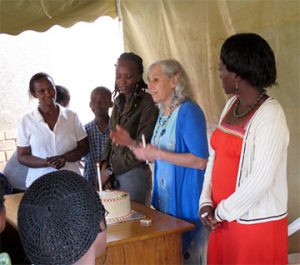
Dr. Goldstein, Hawaa Najjuma, Brenda Nakalembe, and Judith Nassali, celebrating with meditators (photo by Alena Goldstein)
Goldstein coordinated her efforts with Nakalembe and the national director of the TM women’s organization in Uganda. The TM teachers there are Ugandan and speak Luganda, the native language.
“It was always important to Maharishi that people would learn TM in their native language,” Goldstein said. “These are actually Ugandan nationals who are teachers. So it was a collaboration between the TM teachers, Brenda and her team, and me, and we all worked together. Emotionally, it was beautiful.”
After the first group of women at UWOPED learned TM, many of their neighbors started asking about it.
“AWAGO and UWOPED decided to collaborate on a research project to evaluate the TM training,” Goldstein said, “and this is how the research project came about.”
“They have huge resilience, huge endurance. This is the lot they were given in life, and somehow, when given the opportunity to do something, TM helped them to do something for themselves, by themselves.” —Dr. Goldstein
Goldstein’s daughter, Alena, accompanied her to Africa as project videographer; Goldstein had included a research assistant in her funding so she wouldn’t have to go there alone. While the African mothers were defining their own mother-daughter relationships, Goldstein and her daughter were doing the same.
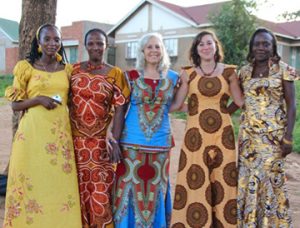
The Uganda research team: Brenda Nakalembe, founder and executive director of United Women’s Platform for Empowerment and Development (UWOPED); Haawa Najjuma, UWOPED co-director; Leslee Goldstein; Alena Goldstein; Judith Nassali, national director of African Women and Girls Organization for Total Knowledge (AWAGO) (photo by Shawn Sendyowa)
“We were working together and living together for weeks at a time,” Goldstein said. “This is one of the beautiful takeaways: We were both transformed by these women, but we were also transformed by being together. It was special, and it changed our relationship for all time. It was just one of the gifts from this project.”
The two American women went to Uganda for a month to get everything organized and make sure all the translations were in place.
“I had to train test administrators—these tests were question-and-answers that anyone could do in a half hour if they could read,” Goldstein said. “But because they couldn’t read, I had to train test administrators who could interview them all one-on-one, 81 people, so it took three days each time.”
“What made all these women come to learn TM—there’s 600 of them now who have learned—is the changes that their neighbors saw in them.” —Dr. Goldstein
It’s not easy to convey a foreign concept through a translator.
“The women don’t speak English, but the TM teachers spoke to them and Brenda in their own language,” Goldstein said.
They didn’t call it scientific research; it was “an evaluation of the benefits of TM training.” Calling it research put the African women off because so many researchers had approached Nakalembe with crazy ideas in the past.
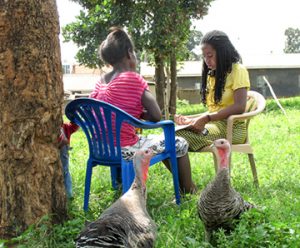
Ugandan mothers serving as research subjects for Dr. Goldstein’s study (photo by Alena Goldstein)
“The first time I met with the mothers, I’m telling them we’re going to do this research, and afterwards Brenda said, ’This is your first big learning experience: No. We can’t call it that, and I didn’t translate it that way, so we have to figure out what we’re going to call it, because this is all about respect. Even though these women can’t read, they’re not educated, they are not stupid.”
Goldstein said the women asked amazing questions.
“They have huge resilience, huge endurance. This is the lot they were given in life, and somehow, when given the opportunity to do something, TM helped them to do something for themselves, by themselves,” she said. “We call it empowerment from within. You can’t empower another person; it has to come from inside. So they started to feel more confident, more motivated. We have lots of interviews where they would tell us, ‘I can think better.’”
“After the mothers learned, they said, ‘I’m feeling so good, but my kids, they really need this.’ So the TM teachers started teaching the kids.” —Dr. Goldstein
Women in Third World countries often take their stress out on their kids, and Goldstein’s group stopped doing that.
“What made all these women come to learn TM—there’s 600 of them now who have learned—is the changes that their neighbors saw in them,” Goldstein said. “They said, ‘Wow, she doesn’t beat her kids anymore. She’s so calm. Where did this come from?’ They just started to flock out of the woodwork to learn TM. We had it sponsored so they could all learn.
Imagine your own children talking amongst themselves: “My mom is meditating and she doesn’t beat me anymore.”
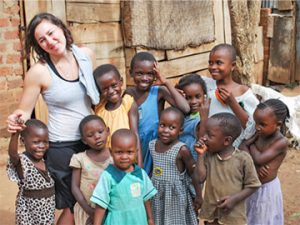
Alena Goldstein, who accompanied her mother as project videographer and “child magnet” (photo by Leslee Goldstein)
“We had a lot of kids who meditated. After the mothers learned, they said, ‘I’m feeling so good, but my kids, they really need this.’ So the TM teachers started teaching the kids,” Goldstein said. “There’s almost 300 kids who have learned. We have a TM club; they get together and meditate together and do fun activities.”
A typical American might wonder why an education is important in an impoverished country where there are no advanced jobs for women. Why is it important to complete school, when you’re going to go ahead and be a mother and clean dirt floors and all that?
For one thing, being able to read is empowering.
Having an education opens doors for these women; it gives them the ability to take a further step to rise from poverty.
“They’re not trying to get rich; they just want to send their kids to school. They want to feed them, and that’s what makes them happy: taking care of their kids,” Goldstein said. “A lot of them want to find a good husband, but the nice thing is that these women have much more self-esteem. They’re not depending on a man to take care of them like they were before. They’re resourceful.”
Having an education opens doors for these women; it gives them the ability to take a further step to rise from poverty.
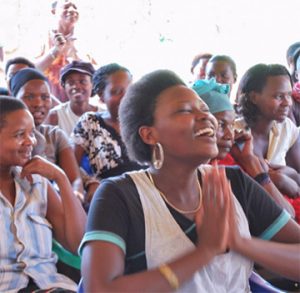
Last TM meeting with mothers at UWOPED in Kampala (photo by Alena Goldstein)
“If they can learn how to manage money, or save money, or utilize the microloan system that’s become very popular; if women can learn things like that—a lot of them study business—there are ways they can make money,” Goldstein said.
She said many Ugandan women study hairdressing.
“When I talk to my women there, every week they’ve got a different hairdo,” Goldstein said.
Almost all the women who answered the follow-up questionnaires—about 70 percent of the original 81—were still meditating regularly, most doing it twice a day.
“I have watched these accomplishments unfold and cannot wait to see what else Dr. Goldstein achieves,” Goodman said.
Goldstein said she almost moved to Uganda to work with former members of parliament to create a women’s university.
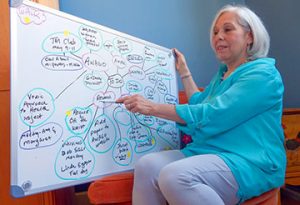
Dr. Goldstein demonstrates her mind map, which she used to organize her research (Bob Saar for The Hawk Eye)
“They wanted me to be vice-chancellor because I’ve got a Ph.D.,” she said. “But it became pretty clear that role was not for a Westerner, especially a white Westerner with silver hair. So we decided that it would be better to find somebody in Uganda.”
Goldstein isn’t done with her scientific research—er, evaluations—and she’s working on new ways to help the women of Uganda.
“These 600 women are just the tip of the iceberg. When you say three-fourths of the women live in poverty, that’s a lot of women,” she said. “A lot of them are widows whose husbands died with the Kony War in northern Uganda, or [from] AIDS.”
And Goldstein understands the reciprocity principle: We pay back what we receive from others.
“People who have given me something, I give something to them,” she said. “I raised $4,000 last year to help buy sewing machines for the women, who learned to sew but didn’t have sewing machines.”
Learn more about African Women and Girls Organization for Total Knowledge (AWAGO) ►
Everybody has a story to tell. Tell yours, or encourage someone you know to tell theirs, in 52 Faces, each week in The Hawk Eye. Call (319) 758-8148, or write to cneises@thehawkeye.com.
Watch the video about Ugandan women who have learned the TM technique (4:59)
Editor’s note: Dr. Goldstein’s research study was published on March 18, 2018: Leslee Goldstein, Sanford I. Nidich, Rachel Goodman, and David Goodman (2018), “The Effect of Transcendental Meditation on Self-Efficacy, Perceived Stress, and Quality of Life in Mothers in Uganda,” Health Care for Women International.
Please contact lgoldstein@mum.edu to receive the full research article.

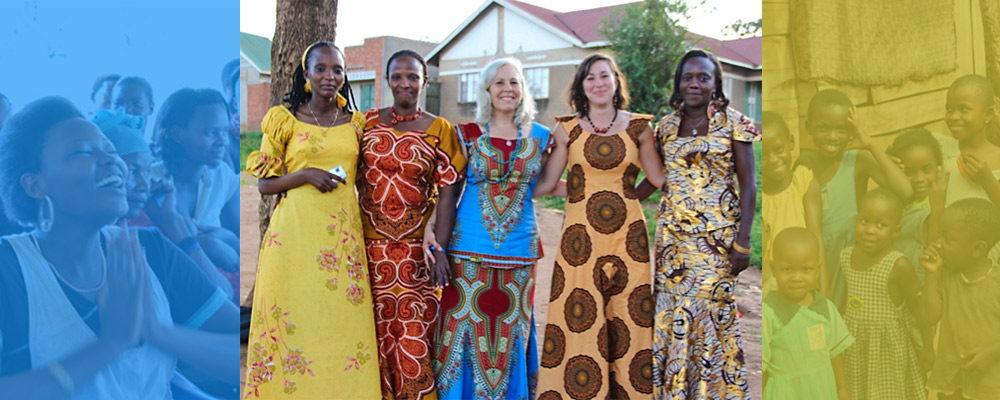
Comments
YOU MAY ALSO LIKE
EnjoyTM.org
Maharishi School: A Unique Vision of Holistic Education
At this PS-12 independent school in Fairfield, Iowa, we teach students to think for themselves, to nourish their own creativity, to approach life knowing that success and happiness can go hand in hand. Learn more and watch videos.
Education
Maharishi School Chosen As One of the Best Private High Schools Nationwide | 4:57
Maharishi School takes the spotlight in recent national recognition from Niche.com. TM is one key to the well-rounded curriculum at this K-12 school in Fairfield, Iowa that placed second in a ranking of private Iowa schools.
Helping Others
2017 Change-Makers Bring Hope to Chicago, Inner Peace to Veterans, Health to Women at Risk
Our TM heroes are creating positive transformation around the U.S.—bringing the life-saving benefits of TM to women who are victims of assault; turning post-traumatic stress into post-traumatic growth for veterans; helping Chicago schools reduce violence and improve lives.
Science & Research
New Study: Helping Women Reduce Trauma in Prison
Reducing trauma for women in prison through the TM technique has far-reaching implications for at-risk populations, says The Permanente Journal, with its publication of this and related research on TM in prisons.